Harry is the hero.
Right?
He’s the guy the story is all about, after all. He’s the Boy Who Lived. He has the scar and the prophecy. He has the sidekicks and the invisibility cloak. He has the mentor. He has the tragic backstory. He faces down the villain.
Harry is the hero. It’s his face on the covers of the books. They’re called Harry Potter and the… for a reason.
Right?
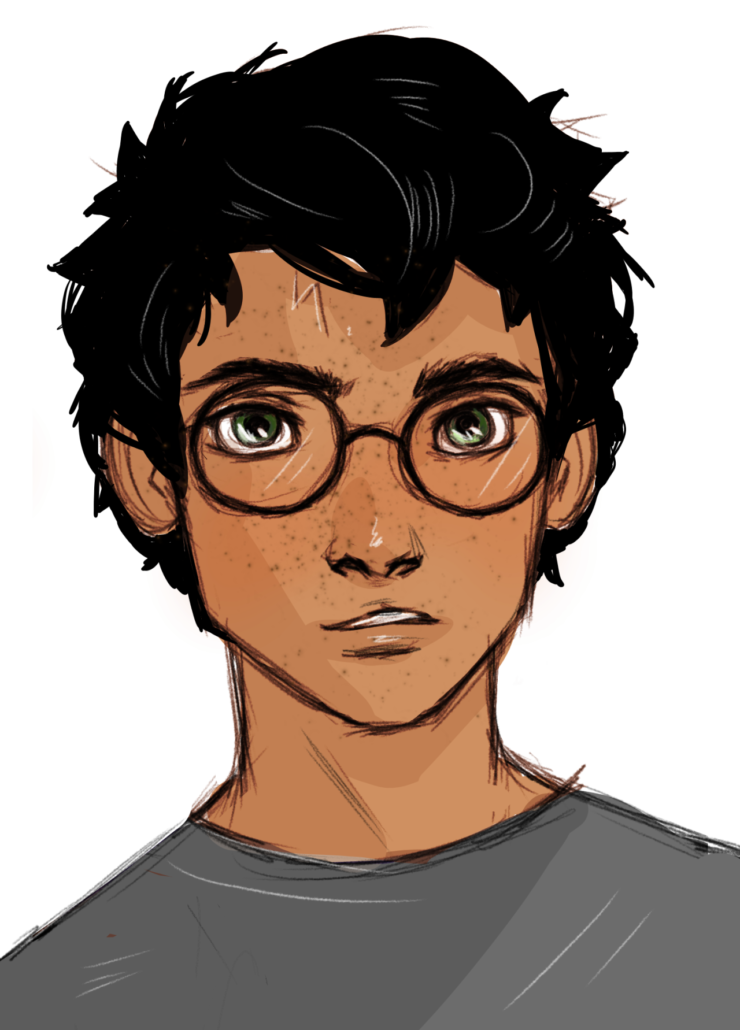
Ron is a sidekick. You can’t deny it. He can’t even deny it. He trips over things and he makes faces and he provides Harry with a Normal Friend. He explains things but doesn’t always get them right. He supports. He humanizes. He gripes sometimes but other times, he’s there. He’s there when Harry needs him, mostly. He holds the team together until he goes off in a snit to explore his options, and when he does, Harry spirals for a while until he comes back.
Ron is a symbiote. He doesn’t get his own story that’s separate from Harry, not really. And sometimes he hates it, but also, he knows that it’s all there is for him. When he’s not with Harry or near Harry, his edges start to fade and people start calling him by the wrong name and he finds himself in a state of hibernation, not-quite-frozen but unable to really move until Harry comes back.
We aren’t discussing Ron right now. He’ll wait. He’ll be there when it’s time for us to get to him. He’ll be there once he’s needed.
He always is.
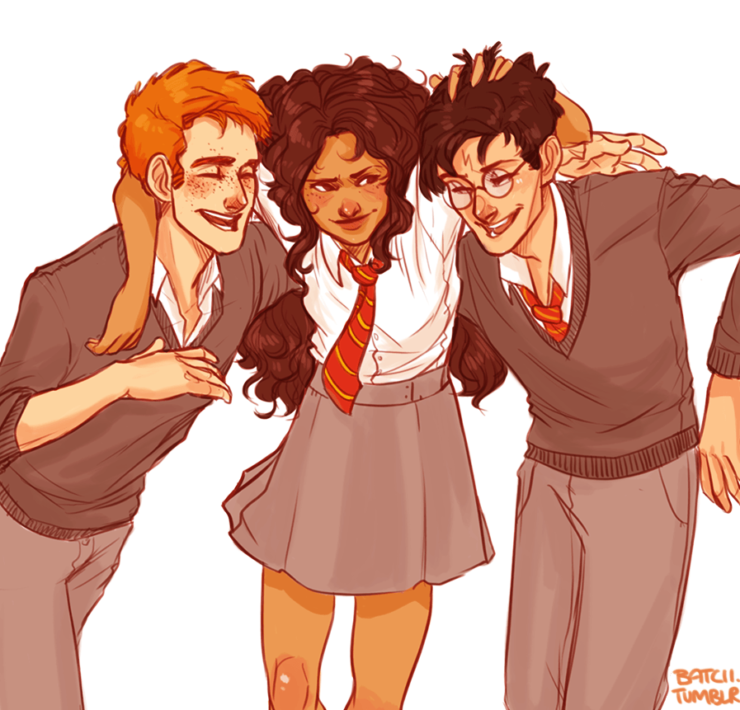
Hermione, though.
What are you, Hermione?
Are you a heroine? Or are you a sidekick?
Here’s the thing with Hermione: she’s always there. She’s always performing the ceaseless emotional labor that Harry and Ron require. She does the heavy emotional lifting so that Harry can continue to Hero all over the place and Ron can continue to sidekick. She is always there, even when she’s angry, even when she’s being horribly mistreated. She’s loyal to a fault, unwavering, unflinching. She’s patient.
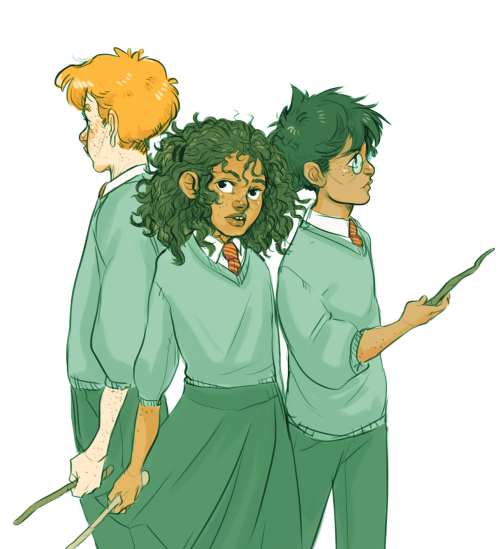
That’s sidekick behavior.
But then.
When Harry’s not there, Hermione is busy. She’s not waiting for him. She decided at some point that it wasn’t Harry’s story, it was everyone’s story, and she acts accordingly. She’s not along for the ride.
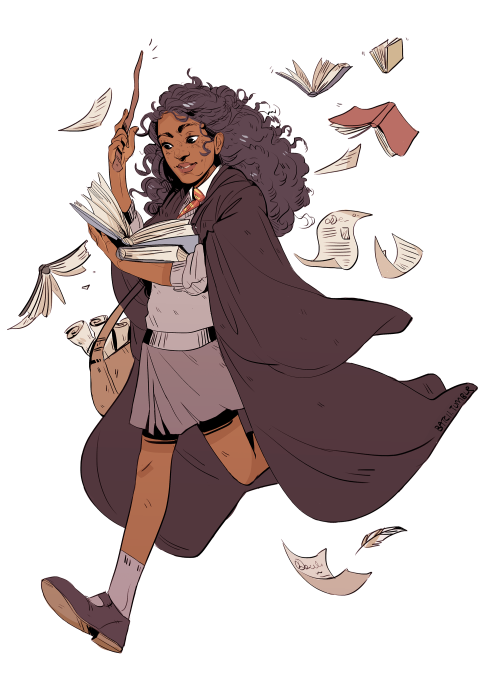
This is something that the Harry Potter fan community has been discussing for years: Hermione drives the story because she has her own story. No one in their right mind would trust 13-year-old Harry Potter with a Time Turner, but Hermione gets one and she deserves it. She dates a celebrity, and she outsmarts Rita Skeeter, and she does those things in the background of Harry’s story. She convinces Harry to be a figurehead in the fight against Voldemort, and she creates Dumbledore’s Army. She schedules the DA meetings, she creates the consequences for DA defectors, she creates the galleons that allow the DA to communicate in code. She researches horcruxes and how to destroy them. She rereads all of Hogwarts: A History. She shows up with the tools and the knowledge and prevents Harry and Ron from standing around looking perplexed while the world ends around them. She saves everyone’s bacon all the time by being smarter and better-prepared than anyone else. Those two boys would be dead a thousand times over without her intervention.
She gets her own story, if you know how to look for it. She has her own narrative that’s completely separate from Harry’s. But does that make her a hero?
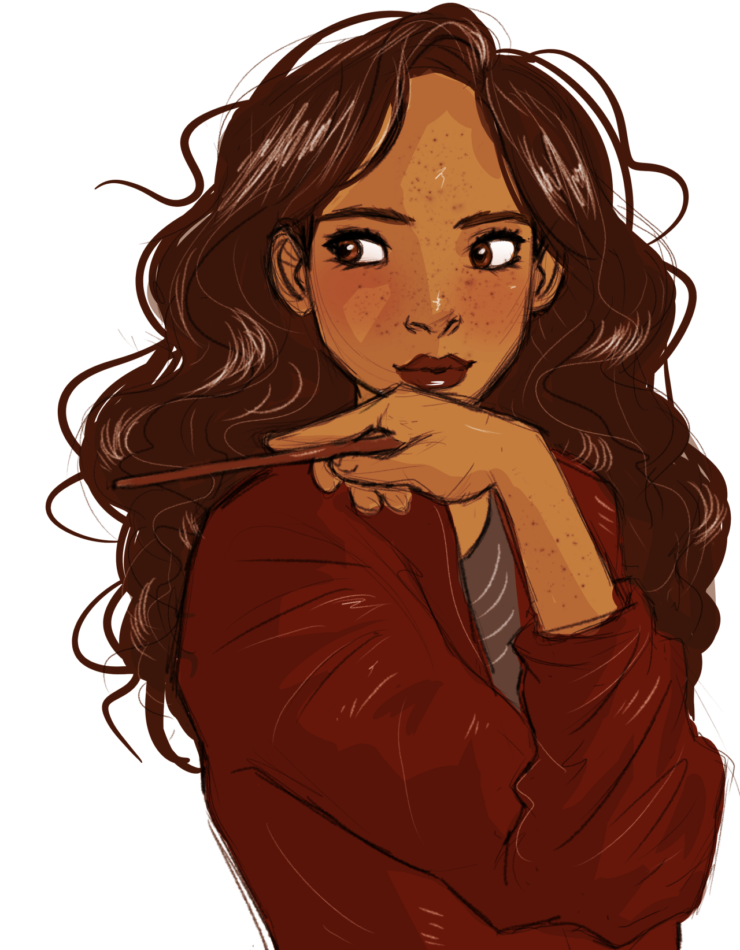
Harry is the hero, right? He stands in opposition to Voldemort. He’s suffered loss at the hands of He-Who-Must-Not-Be-Named. Unimaginable loss.
Except.
In Harry Potter and the Deathly Hallows, Hermione does too. She makes the same sacrifice that Harry did—losing her parents—but instead of losing them to the Avada Kedavra curse, she loses them to her own wand. She erases their memories of her. She hides them in Australia, tucks them away to make sure that they aren’t tortured for information. To make sure they aren’t tortured the same way she’s tortured later in the book.
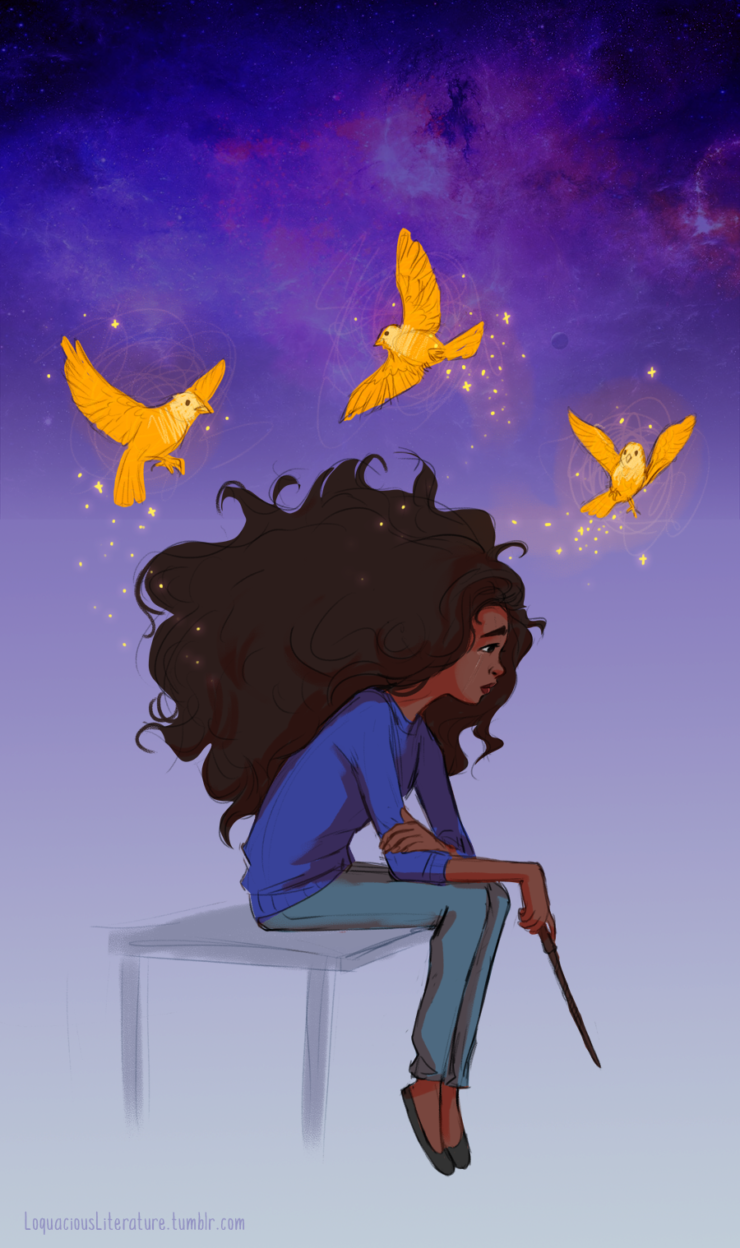
But everyone has lost people. Everyone has missing relatives, dead brothers, inaccessible parents.
That doesn’t make someone into The Hero. Everyone’s the hero of their own story, but not everyone gets to be the hero of this story. Too many people have died in the Harry Potter universe for loss alone to bestow heroism. Too many people have lost everything. Have sacrificed everything.
Sidekicks can suffer, too.
So, what are you, Hermione?

Does anyone in the Harry Potter universe stand in more direct opposition to Voldemort than Hermione Granger does?
Voldemort stands for oppression. He stands for the fundamental superiority of blood-purity. He stands for status, not achievement. He stands for alignment, not friendship. He stands for fealty, not loyalty. He stands for a wizard’s foot on the neck of a house-elf. He stands for the sacrifice of one’s humanity in pursuit of one’s ambition.
Hermione Granger is his antithesis. She’s a muggle-born witch who arrives at Hogwarts prepared to dominate magic. She’s enormously ambitious, but consistently seeks to elevate others when she could easily let them fail. She walks beside Harry even when doing so means putting up with relentless scorn from the people who waver between hating him and worshiping him—even when that scorn is piled on top of the blood-status slurs she weathers continuously throughout the series. She stands up against a centuries-long institution of interspecies slavery, even when doing so means that everyone she cares about will laugh at her. She skips her final year of school in order to help Harry and Ron find the horcruxes, even though it could mean losing every opportunity she’s spent the previous six years working for. She chooses her causes over her ambitions every time, and she swallows the consequences because they’re worth it to her.
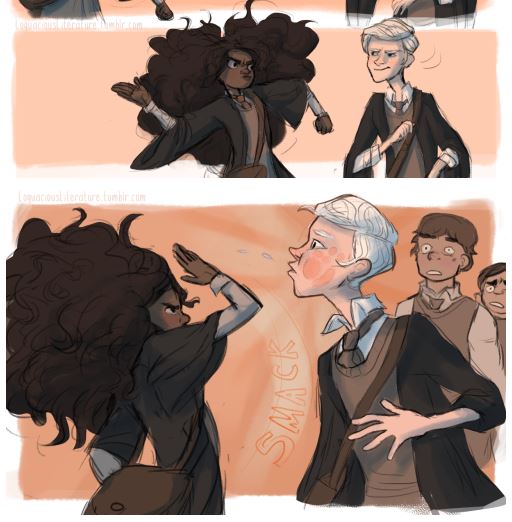
What is Hermione?
She’s relatable. She’s an overachiever who consistently stands in the shadow of The Hero. She pursues victory without ever receiving credit. She accomplishes and innovates constantly without recognition. She is expected to have the answers, and to provide emotional support, and to weather the foibles of others with maturity and grace. She is shouted at for daring to have her own pursuits and interests. She is shouted down for disagreeing with the person who has designated himself In Charge. She is never allowed to be tired or sad because everyone always needs something from her. She must be the best at all times, and she must never demand a reward for her efforts. She is a cypher for every ass-busting girl who has been shunted to the side of the stage while a man who yells at everyone receives a medal from the mentor who’s never seen fit to so much as meet with her.
Hermione is where women and people of color and especially, too often, women of color so frequently find themselves: pushed to the side and asked for patience.
To Harry, she is a sidekick.
To us, she is a heroine.
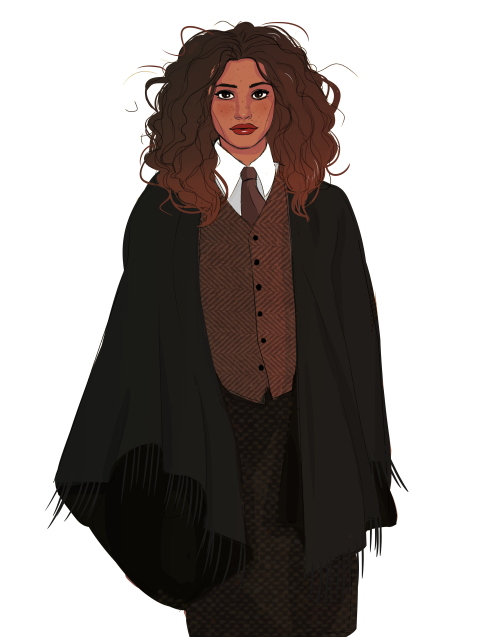
Top image by Frida Lundqvist.
This article was originally published in September 2016 as part of the Hugo-nominated Women of Harry Potter series.
Sarah Gailey’s fiction has appeared in Mothership Zeta and Fireside Fiction; her nonfiction has been published by Mashable and Fantasy Literature Magazine. You can see pictures of her puppy and get updates on her work by clicking here. She tweets @gaileyfrey. Watch for her debut novella, River of Teeth, from Tor.com in 2017.










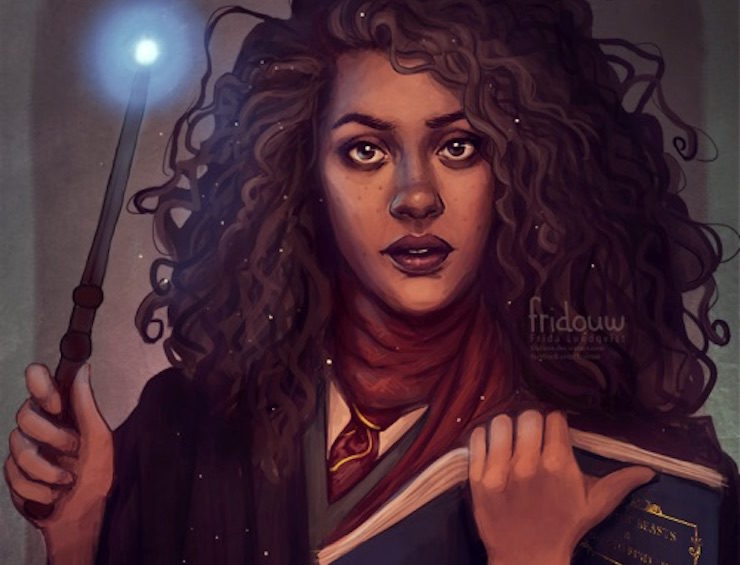
This came across in my Twitter feed: The Hermione books. Maybe someone who’s better at this than I am can actually post the image?
http://floccinaucinihilipilificationa.tumblr.com/image/160340936572
Surely there’s a reason that all the letters of “heroine” are in the name “Hermione” .
Apparently I’ve been living under a rock, because I have no idea why all these pictures depict Hermione as black. “Scratches head.”
@3 Revisionist art. It makes some folks happy. Shrug.
Harry Potter, Hermione, and Ron are an ideal heart, mind, and action character trinity. When a problem needs to be solved, Hermione is the logical mind, Ron the emotional heart, and Harry takes both’s impute and creates the ideal action.
These characters can also be considered a thesis, antithesis, and synthesis. Two opposite sides of a problem from Hermione and Ron, and Harry pulling both together to find the solution.
Three major characters like this can be a very powerful means of telling a story because they are not only working together but also working against each other. They can even reflect the complex nature of the book’s world or the moral dilemma of the story.
That is not to say that Hermione isn’t her own woman with her own agency because she most certainly is. She is also considerably more interesting as a character than Harry or Ron.
@@@@@ 4 – well, first off, I don’t think it’s ever stated what ethnicity Hermoine is? So… show a bunch of different looks and let people choose what fits their mental image best.
And while I get what you’re saying about heart, mind, and action, it doesn’t really fit. Ron has no claim on the “heart” piece. He’s a good person, generally, and obviously represents family and being welcomed into the Wizarding world for Harry, but it’s very difficult to claim he’s any more the emotional core or voice of the group than Harry or Hermoine. He acts very much as you’d expect a teenager to act, so I don’t blame him (and it’s one of the few things Rowling writes well), but he’s probably the biggest ass and least emotionally stable of the group. He is consistently the pettiest and most shallow of the group.
To the larger point; while Hermoine is the brains, and the most prepared one of the group on a consistent basis, and the one most willing to correct injustice, this is WAY too puffy of a piece. She’s also incredibly superior and arrogant, can be petty herself, and is very self-aware of her intelligence and resents those whose natural capabilities exceed her own. She would make a great researcher but an awful inventor. When Harry excels at Potions, she’s pissed. She’s pissed that he’s doing better than her, that he’s doing it by not reading the “official” instructions, that someone is beating her at something. As a Prefect, she’s unable to understand that rigid enforcement of the rules is not always the only way to go.
And to be honest, she isn’t good at networking. She’s friendly with Harry and Ron, and later Ginny, but that is due to Harry and Ron’s actions, not hers. We don’t hear that she’s particularly friendly with any other students. In a story so bound up in themes of intimacy and friendship and creating family units for yourself, Hermoine notably doesn’t do any of that.
Which isn’t to say she’s not one hell of a kick ass lady, or absolutely integral to the good guys winning out, but she needs Harry and (I guess) Ron as much as they need her.
Individually, based on their lives and actions, there are many heroes in the Harry Potter novels. Harry, Hermione, Ron (I’ll argue with you on this if you say no), Dumbledore, Neville, McGonagall, and many more. The question is not whether Hermione is a hero/heroine. She is. The question is whether Hermione is THE hero/heroine of the over-arching story of the final defeat of Voldemort. She isn’t. Through no fault of his own, that hero is Harry and the series is about Harry gaining the skills, allies (not sidekicks but allies), confidence and maturity to do what must be done to stop Voldemort. (Still avoiding spoilers, just in case.)
For Hermione to be THE hero/heroine of the series is to place her in the position of having the agency and responsibility to set Harry up for his bravest act, because Voldemort could be defeated no other way. She tried to prevent him from doing that when she discovered what it was. Harry did that (with help) of his own free will. Harry is THE hero of the series. But Hermione was never a sidekick. She was an ally, superior in some respects, weaker in others, but usually on a level with Harry.
Now, if you want to argue that Hemione is the hero/heroine of any particular single book or storyline WITHIN the series, I’ll probably agree with you. She is awesome. She’s just not the hero/heroine of the series.
Hermione is the greatest character in the Potterverse, for sure. I suppose the interesting thing about her story is that she is allowed to be things that Harry isn’t. She is allowed to be familiar with the Wizarding world and meet it on her own terms. Harry, because of his sheltered and abusive upbringing, but more importantly because of the narrative demands, has to be constantly a bit of a dope. The wizarding world needs to be new and amazing to him. She can come to well-reasoned conclusions and make the right decisions immediately; Harry needs to work at it, and fail sometimes.
The flip side of this is that Hermione is too conscientious to take the kind of mistakes that Harry Potter makes. And Harry’s heroism isn’t just defined by his losses–it’s defined by his willingness to admit that he was wrong and mistaken, and his willingness to forgive people who have wronged him. Hermione’s sense of justice is awesome, but I think Harry’s acceptance of mercy and forgiveness, and his ability to overcome his own failures, are at the core of the Potter-ethos. In that sense, I don’t think she does stand in his shadow–she’s his beacon.
The books and movies fail Hermione a bit though. The romance with Ron never feels quite real. Really, the urge to pair everyone up at the end of the series was awful–why do we need to see Potter The Next Generation at all? And why does no one ever meet anyone they didn’t go to high school with? Ugh.
@5 Hermione on the Bloomsbury cover of DEATHLY HALLOWS is white, and, since HKR, unlike us mere mortal authors, has control over her covers, I’d say that white is canon. That said, if a black, red, or yellow pleases your inner version of the character, good for you.
The issue of Hermoine’s ethnicity was discussed in length in the original post (which is linked at the bottom of this re-post). I highly suggest everyone read the great comments there.
@8 Except that JKR said, when Hermione in the play was cast as Black, that she did not specify Hermione’s race, and that Black was consistent with canon.
The cover had to have a color, but colors on covers should not be taken as canon. For example, one cover for Octavia Butler’s Dawn showed Lilith as pale white, despite the book having her clearly Black, in text. Covers are routinely whitewashed. And not objecting to a cover is not the same as incorporating it into canon.
@10 Not meaning to fight about this, but, like almost all authors, Butler had no control over her covers. JKR does. She also had considerable say in the young actors who starred in the movies. If H was black, she’d have been played by a black actor. If your head canon is different, so be it, but it’s not JKR canon.
This essay is a breath of fresh air; thanks for writing it!
@11/MByerly: JKR’s comments regarding her canonical view of Hermione’s appearance are not difficult to find and flatly contradict you. Even if it were true that she had as much control as you claim over dust-jacket art and chapter illustrations and film casting, that only establishes that she found them to be acceptable adaptations, not necessarily the definitive representations of the various characters.
The zombiness of the what-color-is-Hermione debate is particularly frustrating because her physical characteristics are not just vague in the published text but also might be the least relevant, among the significant characters, to any major plot or thematic elements; apart from a couple chapters in GoF, when was her appearance at all notable? It’s impressive that the author ‘drew’ such a rich character (see above!) who allows all readers to essentially form their own mental image—all of which are equally correct within certain limits.
@ian and others: To me, a cisgender female reader who doesn’t fit the Western archetype of female beauty, Hermione’s appearance as described in the books WAS noteable; in the first few books she had messy hair and bad teeth (characteristics I also had when I was her age). In the current culture of body-shaming and female body objectification, I would argue that her appearance as described by Rowling is VERY important.
If you recall, Hermione is called a “Mudblood” by Draco and other characters in the series. Not only does that suggest racial connotations (mud is BROWN, after all), but also the impression I got was that was the equivalent of the “N-word” in the U.S. – pretty much the worst thing you can say about someone and a deliberately racial insult. Also don’t forget that Hermione lands up with Ron, who is coded as Irish Catholic, an oppressed minority within the U.K. (from what I understand).
Also, there is nothing in the actual text of the novel that codes Hermione as white. I’d ask everyone on this thread: WHY might you be upset by the idea that Hermione might not be white? What is “wrong” (please understand those are MASSIVE sarcasm quotes!) with seeing her as a woman of colour?
I showed this thread to my partner, who, like me, is a big Harry Potter fan. He noted that in the text of the novels there actually is nothing that proves that *Harry* himself is white. Harryhas blue eyes and messy dark hair; but that does not necessarily mean he is Caucasian. I’m aware that the films “white-washed” the characters from the books, but I think we all should embrace the possibility of diversity wherever we can find it. I personally LOVE all the images of a non-white Hermione in this post!
I hate to be that guy – but I have to make one correction, jaime – Harry had green eyes. Still, point taken!
As to the Hermione/Harry colour debate, I think the main pushback from many fans is that there have been almost 20 years of art/movies showing the characters a certain way, and it seems to be only in recent years that there has been a change in how some characters(notably Hermione) has been portrayed in art. Not saying it’s a bad thing, but I’m not surprised by the fact that it’s confused some(especially in the colour-obsessed Western culture in which many of us live..*rolls eyes*) Just pointing this – I can say for myself, I was a bit taken aback when I started seeing pictures of a “non white” Hermione pop up a few years ago. We all are very good at forming certain mental images of characters as we read – and it’s not always easy when those get disabused by alternative portrayals.
This is an exercise I’ve had to work through myself as I get excited for an upcoming film of one of my all-time favourite books – “A Wrinkle in Time”. I have loved this book since childhood and it’s been a bit of a challenge for me to reconcile myself to the fact that some of the characters will not look quite like I imagine them every time I read! Does this make me a horrible person? I hope not. But it’s helpful to analyze ourselves and understand our own inherent biases. Know thyself, etc. And strive for improving thyself, each and every day. Apologise for the digression here, but just wanted to share my thoughts on this.
Well, he has red hair, which is somewhat common in Ireland, Wales, Scotland, and slightly less common in the rest of the UK, so probably Celtic/Viking roots, but that doesn’t code to Irish over here. It’s just too common to really make much of a guess as to someone’s background.
Religion is deliberately ignored in the HP books, but in general in the UK, most people aren’t actively religious. It’s considered unusual to go to church for anything other than funerals or weddings these days.
JK Rowling gives more than enough hints in the books that Hermoine is white. She doesn’t come out and say Hermoine is white, any more than she says Harry is white. JK Rowling is white and typically authors don’t feel the need to describe someone as white. I would even go so far as saying it’s the default race when written by a white person. But JK does describe black characters as black (Lee Jordan, Dean Thomas, Angelina Johnson), which I think is common for white writers (these are opinions are based on decades of vast reading experience).
Also, there is this sketch by JK Rowling, in which Neville and the Trio are clearly white while Dean Thomas is clearly black (Dean’s original name was Gary).
I frankly don’t waste much time worrying about what color a character is. Mud-blood is reminiscent of the “n-word” but in my mind and in the context of the book I am reminded much more of the Nazis who talked about tainted blood; and they were not referring to blacks.
In other news, I always played with the concept that Harry was the Slytherin (disregard for rules), Hermione was the Ravenclaw (brilliant), Ron was the Hufflepuff (loyal and supportive), and (as we learned in the final book) Neville was the Gryffindor (brave and valiant—can you say “Hey Voldy, kiss your snake goodbye!”). Taken together they represent the entire school.
Well, that didn’t take long.
The discussion went from “Is Hermione the hero/heroine?” to “What skin tone does the character have?” And all because of the choice of pictures to go with the article.
So, for the record. When I read the books, I thought Hermione was was white, reinforced by the movie. When someone raised the issue that maybe she wasn’t, I remembered the kerfuffle about Dumbledore being gay in Rowling’s mind even if she didn’t say so on the page. Rowling has never definitively stated Hermione’s skin tone, one way or the other. There’s leeway to argue … so I don’t bother arguing. Believe what you will.
Now, can a character be heroic without being the actual hero/heroine of the book/series? Does that automatically reduce them to “sidekick”?
I was previous agnostic on the matter, but I’m convinced now–all the nitpicking over minute details in the books that prove that Hermione is white have convinced me that she should always be black, going forward.
“To Harry, she is a sidekick.
To us, she is a heroine.”
Interesting article, but that’s a crummy close. I don’t consider my friends “sidekicks” and I doubt Harry does either. Hermione is a heroine and I expect Harry knows it.
I wonder if “Mudblood” could have been in the Potterverse a corruption of “Muggle blood”? I’ve always taken “Mudblood” to indicate a slam against skill, with the implied question ” How could someone w/ a Muggle background have the skill to be a witch or wizard?” In Deathly Hallows, Umbridge interrogates Mary Cattermole about her background.
Thank you! I have been thinking those same things about Hermione ever since I first started reading the books. She gets shunted aside when she’s one of the most loyal, persistent and smart characters in the book. I think she IS the main character of this story. Without her their is no story. That’s also why I am so mad that her and Harry Potter we’re never together in the end of the story. Ron and her where just an abusive relationship. Harry and Hermione were more of a couple then Genny and Harry could ever be.
Oh and by the way did you ever think that J.K. left that character purposely ambiguous so that every girl can identify with her. Not just blacks or whites?
The entire argument in this thread over Hermione’s race is, in my view, quite silly as JKR has addressed the issue explicitly when it arose following the controversial casting of a black woman as Hermione for The Cursed Child play. Here is precisely what JKR posted on Twitter on 12/21/15: “Canon: brown eyes, frizzy hair and very clever. White skin was never specified. Rowling loves black Hermione.”
Fiction writing allows the reader to imagine any character’s appearance however he or she wishes, within the express description provided by the author, so some readers will imagine Hermione as black, while others will view her as white…or maybe some other skin tone. Based on the descriptions in the books, all would be correct. One of the many reasons movie adaptations often ruin books for people is because the image of the actor playing the character often becomes fixed in the reader’s mind and the reader can no longer imagine the character looking different; whereas, the reader may have had a very different mental image of the character before seeing the movie. I know that has happened to me on a number of occasions over the years…and I suspect that is one reason that this thread now exists.
In some ways I have to agree with 20, haha. I think Hermione was most likely intended as white (or rather, Rowling never really thought that the default would be anything else) as shown by old sketches, etc, but all the hand wringing etc makes me like black Hermione all the more.
Regarding the article, I doubt Harry actually views either of them as a sidekick, and neither do I really. Harry may be the one that VOLDEMORT has focused on (thus kicking the prophecies off) because of their similarities, but to me the triad are all vital parts and in some ways that’s the point of the series.
What I find frustrating about arguments based on old sketches or implicit white-English bias or whatever is that they implicitly presume that an author’s initial ideas are somehow more correct than later revisions, which seems to me a complete misunderstanding of the creative process. Hermione appears in nearly every scene across seven novels, and in a good chunk of one play, so JKR had ample opportunity to more clearly describe the character’s physical appearance if she had wanted to do so. The fact that the focus was instead placed upon Hermione’s skills, knowledge, and personality, with her looks left to the reader’s imagination, is probably a far better indicator of authorial intent than any 25-year-old doodle (and never mind the extent to which the reader should consider authorial intent at all!).
I’ve pondered both this story and ‘sidekicks’ from other works, and I’ve found that the line between co-hero and sidekick seems kinda fuzzy. Any competent hero needs to choose companions who are similarly brave, in possession of complementary skills/powers, and have the willingness to challenge the hero’s judgement when necessary to prevent avoidable mistakes; Ron certainly matches Hermione in these regards, even Ginny and Neville at various points. What I think really distinguishes Hermione here isn’t so much the number of things she does but that she develops an independent agenda (i.e. her efforts to improve the wizarding world’s legal/social conditions in general and their treatment of non-human beings in particular). It seems that such independence, the potential to put the character in focus in a way that tells a different (but related) story, may be the line at which sidekick is no longer the appropriate term.
Great point in your second paragraph, Ian. Hermione does have her own agenda and it’s complementary to Harry’s because it addresses the deep flaws in the wizarding world which Voldemort exploits. Harry’s issue with Voldemort is personal, Hermione’s is structural. A good successor novel might well focus on the faultlines we see between the 3 main characters on issues like elf liberation and the relations with goblins.
Oh please! Of course Hermione is a sidekick. She’s more of a sidekick than Ron. Her only purpose in the story is to provide exposition. She has no character arc at all. She doesn’t grow as a character as the books move along, she’s stuck in her old ways of thinking, where only logic and facts matter, through the end of the story. There’s a reason we don’t know about her life outside of Hogwarts and thats because she’s just not that important. Any number of characters could have been changed to the ‘smart one’ – Dean, Seamus, Neville, Lavender, Parvarti – or Rowling could have found other ways to have Harry and Ron get the information they needed.
I don’t think that’s quite fair. Hermione learns to be a friend, and she learns to listen to what House Elves think and feel rather than project her idea of what they SHOULD think and feel on them. But yeah, she’s a sidekick. It’s Harry’s story. Live with it.
I think the reason why such a great focus is placed on Hermione’s ability and skills instead of race is very simple; race or skin colour is really a non-issue in the wizarding world and the interracial issues are represented by blood status. However, given how much fans have obsessively discussed every other minute detail of the books and spanned thousands of theories to support them, why wouldn’t they spend hours discussing this?
@Andy
You forgot Ron is the heart of the group because he is the person the other two in the group is the closest with and he is the one who provides tonnes of emotional support for them just look at how the group fell apart when he wasn’t around for confirmation of that. As for him acting like an ass at times, well I don’t think anybody can deny it but the funny thing I noticed now is that there were lots of times when Harry or Hermione acted like asses and the books don’t show them as such or actually praised them for it.
@colin R
Here’s the answer to your question about marry high school sweet hearts. You shouldn’t be so quick to implement real world standards in a world with a tiny population in an isolated community. The same goes with the romance not being real.
https://www.tor.com/2016/05/26/the-harry-potter-reread-the-deathly-hallows-epilogue/
@ian
You made an excellent point about how to distinguish co-heroes and sidekicks and I agree with the definition. However, if we’re going by this definition, then I feel at least Ron, Neville and Ginny both got their own rather important storylines/agenda that are separate from the main plot. There is Ron’s struggle to overcome the natural insecurity from living under the shadows of his talented brothers and his best mate (although not really much from his girlfriend) and Neville’s journey to being from the laughing stock of the year to an alternate and in some ways even more heroic than the protagonist. As for Ginny, there’s the growth for her to be herself in front of her crush instead of being a just a girl with a crush on the big hero.
Sadly I think the words hero and sidekick are just being tossed around to tear down characters they don’t like or make one character unworthy relative to the other, e.g. Ginny is just a tertiary character, who shouldn’t end up with the hero like the heroine Hermione is.
@AmberW
Your comment just confirms a rather unflattering description of Harmonians made in an interview just after HBP was released as you don’t seem to get the idea it’s possible to like a fanon ship without tearing down the canon ships and making insulting remarks. You also seem to have lots of misconceptions about Harry and Hermione’s relationships.
Here’s a rather comprehensive essay against your case:
https://www.hp-lexicon.org/2004/10/28/dyou-really-think-theyre-suited-why-hermione-is-not-the-right-girl-for-harry/
@Bigstik
Really good point about the lack of information on Hermione’s background, heck we don’t even know her parents’ names!
But here’s the thing: there’s a militant sect of the fandom who thinks Ron is nothing more than a secondary character unworthy of the heroine Hermione despite the fact Ron was in the books more than Hermione was. However I would certainly consider them to be of equal importance and I am disappointed we don’t get to know more about Hermione’s family life.
Sarah, all your analysis in them threads are so engaging, I can’t stop myself from commenting. Well done.
It is unfair to compare between Harry’s loss of his parents, to Hermione hiding hers. She can bring them back, he can’t. She had til that point loving fostering parents, he didn’t. I could continue, but that feels enough for now. About THE hero in harry potter, is it just your way of impulsive writing, or do you really think that Hermione is the “real” hero? (I don’t like those comparisons. it narrows the way we percieve and look at those characters. But if you want it that way here it goes)
This is JK’s story, therefor I’ll unfold my thoughts on who she might see as the hero. Let’s remember that JK wasn’t a writer from the get go. It’s not like she was sitting comfortably in her sofa trying to find an idea of a good story to sell to kids. In my opinion She undertook the idea of Harry Potter as a “self implied therapy”, while her life was at that time at a certain low. She was left alone, suffered from poverty while needing to feed a kid, after a bad relationship. Harry was what she would like for herself in a way, an Cinderella story where she flees from her miserable life to this new magical shiny world, were she is all of a sudden no more poor and beloved, she plays a central part in society and not cast aside. “Harry” was her way to run away, to cling to some hope… So Harry is JK’s emotional turmoil, while Hermione is the other side of the coin. Hermione represents the best that JK has/can achieve. It is mentioned in former posts here, that Hermione is a bit too perfect. So Harry is “what I went through” and Hermione is “what I can be”… Harry is emotionally her greatest achievement, he is deeper rooted in her because of that, and therefore is her hero in my opinion. We feel for her characters so much, because those characters were “translated” for us from her tough life she had, and Harry is therefor at the top. No wonder then that JK stated that even though the story “needed” Hermione and Ron to end up together, she personally may have linked her with someone else (harry in my opinion, as that would finally bring those 2 sides of the coin in herself to a harmony)…
Hermione Granger is a sidekick. She is an important, well rounded sidekick but Harry is the hero – a fact she accepts. So should you.
@32 That is some really engaging analysis and I completely agree except for the end. Harry and Hermione getting together wouldn’t bring the so-called harmony that a militant minority of the fandom wants unless they undergo major personality transplants. This fact is made crystal clear in the books when Ron was absent from the group and I feel there’s no need to go into details here.
@34 – of course I agree with you that from the story’s narative point of view it doesn’t add up for Hermione to end up with Harry. It was always Ron. But that’s what I meant, as I stated JK that the STORY needed them to come together, BUT JK on a personal level would want for Hermione someone else. Now I don’t know of course who she meant. But it leaves you thinking why JK has two different point of views? Why, the story is what she wanted it to be from the get go, so how come there is – what the story needs, and then there is what she personally felt? shouldn’t it be the same thing regarding the author? It seems as if the closure of a good story has it’s own will, but JK wanted something else. So I guessed it has something to do with her deep relationship with her characters, and my best guess was a harmony between suffering JK aka Harry and succesful JK who bested her tough times aka Hermione.
@35Very late response as I came across this page again just a moment ago.
I think it’s certainly possible that sometimes Rowling thinks of Hermione, who is supposed to be a representation of her younger self, could end up with the hero Harry although from a story perspective, it will fill up the pages with more romance than Rowling desires.
Your guess of the deep relationship is as good as any other.
In any case, it is probably one of these questions we will never know for sure given that Rowling has moved on to the Fantastic Beast franchise now.